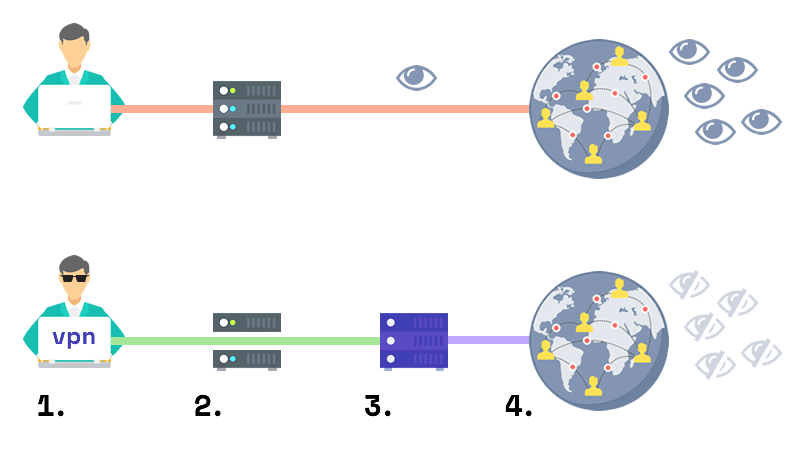Virtual Private Networks (VPNs) are a popular tool among security connoisseurs and privacy junkies around the world (not to mention certain countries which seem to think that the Internet is a threat that should be… ahem… firewalled).
For those embarking on a path of online entrepreneurship, VPNs, if used right, can be an extremely useful tool – or, rather, an entire toolkit 🧰 – that makes their life easier and even allows outsmarting the competition.
A VPN works to protect your online activities by forwarding your internet traffic directly to a remote server, which then allocates you with a new IP address. To the rest of the Web, your browsing therefore appears to be coming from this new location (of your choice).
Your personal data (1) is kept hidden not only from the Web (4), but also from your Internet Service Provider (2) as the VPN encrypts all traffic passing through its server (3):

As a result of this complex data choreography, Virtual Private Networks offer privacy, anonymity, as well as enhanced security and the ability to unblock restricted content – all while maintaining your comfortable Internet connection speeds.
So, what makes a VPN particularly valuable to webmasters?
When it comes to SEO, social media and content marketing, here are some of the definite advantages of using a Virtual Private Network:
#1 Reputation Protection 🥽
When considering the need to safeguard confidential data, a VPN becomes an attractive option for webmasters who frequently handle personally identifiable information pertaining to clients.
Adhering to data laws – which are evolving fast – can feel like a burden to online creators and marketers. However, the mere thought of dealing with the consequences of a data breach should be enough to shift any business into gear and start taking their security seriously.
A blow to your reputation, a lengthy recovery process, and potential legal consequences are all likely outcomes of a data breach – it’s wiser to stem such risks in the bud rather than to deal with the results, don’t you agree?
#2 Security when Surfing Public Wi-Fi Networks 💻
Webmasters who need to work remotely, or use their personal device when traveling (i.e. every one of them) should be aware of the risks of public Wi-Fi where man-in-the-middle attacks are rife.
Bad guys frequently exploit hotspots in cafes, airports and hotels, as these are often encrypted and can be accessed without a password. Browsing without a VPN can expose your login credentials, financial details, or confidential information about your clients if your Wi-Fi connection is intercepted by snoopers.
A VPN acts like a trusty shield for webmasters and freelancers on the road, protecting their data with strong encryption at the source (AES-256 being the standard) and making them virtually impervious to Wi-Fi hackers.
#3 Better Search Engine Optimization 🔎
Getting to the first page of Google results is a holy grail for any webmaster, even those who do not explicitly rely on SEO for their business’ survival.
Having an abundance of IP addresses at your disposal via a VPN, you can vastly expand your analytic capabilities by tricking Google into thinking you’re in an entirely different location.
More accurate data on search results and keyword rankings can be obtained this way, and you can accurately view advertising campaigns through the eyes of their target audiences in different countries and regions.
#4 Uncensored Access to the Internet 🔑
Many countries enforce varying degrees of censorship – and not just China, which is notorious for its Great Firewall; places like Russia, Turkey, and even Singapore (!) are known to limit their dwellers’ access to certain web resources on a regular basis.
In this context, a VPN is a boon for webmasters working from places with overly nosy authorities; a way of circumventing governmental censorship means they can do better work, with less disruptions.
Which VPN Features Make for a Trustworthy Provider?
It comes as a sigh of relief that most top VPNs are quite affordable and even offer you to try a VPN for free. Besides adequate encryption protocols, number of servers, and high connection speeds, there are a few extra features to look out for when scouting for the best VPN:
- No logs policy: most paid VPN services that care for your data don’t keep information relating to connection times, IP addresses or browsing activities. After all, the entire point is to hide your activities from prying eyes, so the last thing you need is your VPN company keeping track of your web usage.
- DNS leak protection: simply encrypting traffic and obtaining a new IP address isn’t always enough to stay private. When entering a website URL a search has be performed (by a DNS server) in order to display the correct content relating to the visited address. By using a VPN’s DNS leak protection (offered by many top providers) you’ll have the added benefit of protecting your activities from being exposed, collected, and analyzed by your ISP.
- Kill switches: this is a pretty handy feature if you absolutely must ensure that data never gets accidentally exposed when using a VPN – even if your laptop disconnects from Wi-Fi accidentally. A kill-switch works to halt all internet traffic in the event of a VPN dropping out, and only allows traffic to flow once normal service has resumed. It provides that extra peace-of-mind for the most consistent proponents of privacy and security out there.
Getting a decent VPN is a smart move that can allow a webmaster to get broader insights into various markets, enjoy a smoother workflow, and stay safe against malicious attacks.
Investing in a new tool is always a painful process, yet for those who depend on the Web for their livelihood, a trusted VPN is something of a basic necessity rather than a fancy add-on.
